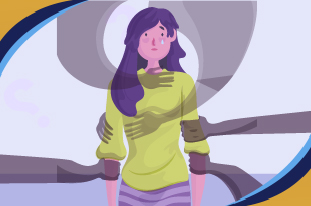Obsessive-compulsive disorder is a mental disorder with irrational thoughts and repetitive patterns. The person may fear irrational beliefs and thoughts. Between these painful cycles, pain holds a power within this disorder. A person with OCD can suffer from guilt or shame. Further, we will dive deeper into how guilt plays a role and what treatments can work for this mental disorder.
OCD And Guilt? How They Are Closely Connected
These two are powerful emotions that form a painful cycle for the individual. The OCD in a person is responsible for intrusive thoughts. But the guilt and shame arise when they start believing in their harmful imagination. This creates fear and shame in them as if they did something wrong. This OCD guilt will make you feel like a bad person. Also, they will feel ashamed to openly express their fear publicly. This addition of guilt in OCD disorder can add more pain to their lives.
Read More: Do You Ever Wonder That Your OCD Thoughts Are Not Real?
Why Guilt Feels So Intense In OCD
Regular guilt may pass when the mistakes are corrected. But the guilt hits differently in OCD. This can create unimaginable pain for an OCD person. This can make the condition even harder for a person. For instance, I thought of “what would happen if I hurt someone?”. This thought is just based on their imagination. They are not even near or exist in reality. But these thoughts can trigger them. This excessive guilt OCD can compel a person towards self-punishment or avoidance. Besides this, the guilt will make you feel terrible about yourself, which further causes anxiety and depression. This will lead them to seek constant reassurance.

Subtypes Of OCD Where Guilt Is Most Common
You will discover guilt as a common emotion in subtypes of OCD disorder. You can find the different subtypes of OCD disorder. This way, you will quickly determine your treatment for your mental well-being.
Relationship OCD:
You may feel insecure in relationships, which is quite normal. But it hits differently for people with OCD disorder. The minor doubt can trigger you. It can lead to uncontrolled thoughts. You may think that you are not good enough for your partner. These repetitive, toxic thoughts will drain your energy.
Contamination OCD:
This subtype includes the fear of germs. This way, a person may fear getting ill because of uncleanliness. Their obsession with cleanliness restricts them from using public restrooms. They have an excessive obsession with washing hands and cleanliness. They use gloves as protection to touch any object to reduce their anxiety.
Moral OCD:
This category specifically revolves around the religious beliefs, ethics, and moral values of someone. Also, breaking religious rules can lead them to extreme guilt and OCD. They might think they are not an honest person. They will remain in constant fear of doing something that goes against their religious beliefs.
Harm OCD:
To feel uncertainty is normal for human beings. But to seem obsessed with violent thoughts is another debate. A person with harm OCD will fear harming themselves or others. Although people relate OCD to guilt over past mistakes that are based on real-life events. But the harm OCD is not reality-based. It is nothing more than a painful imagination of hurting others. This will lead them to create a safe distance in relationships so they won’t hurt their partners.
Read More: OCD in relationships: Understanding, coping, and supporting each other
OCD & Guilt Cycle: How Obsession & Guilt Feed Each Other:
Guilt benefits us by realizing our mistakes. But two types of OCD guilt exist. The healthy guilt compels you to correct your mistake, while unhealthy guilt can create unhealthy barriers. It will make you feel like a filthy person over assumptions. Also, the obsession with guilt makes it even worse for a person. However, you can explore how unwanted thoughts work in a certain pattern.
Intrusive Thought:
An unpleasant thought may pop into an OCD person’s mind, for instance What if I ever hurt them? This can cause panic disorder in a person. This can lead them to think more frequently about intrusive thoughts.
Emotional Reaction:
Afterwards of these unwanted thoughts, a person will feel intense guilt or shame without the intent of doing wrong.
Compulsion:
A person will try to undo the thought by maintaining a distance from people. Also, schizophrenia delivers symptoms that are similar to OCD disorder. For instance, they act upon the command auditory hallucination while doing handwashing.
Temporary Relief:
A person may succeed in running away from their guilt for a certain period. But it will come back with vengeance via new obsessions and fears.
Read More: Which Brain Region Is Believed to Play a Critical Role in OCD?
Signs You May Experience Guilt: Driven OCD
The following are a few signs to notice that can badly affect an OCD person.
- You may notice things that you have never done.
- You avoid your loved ones to protect them from any harm
- The terrible thoughts make you feel bad person.
- You repeatedly ask for forgiveness
Treatment Options For OCD And Guilt:
There are several treatments and self-strategies available to deal with OCD and guilt.
Cognitive Behavioral Group:
This therapy will be effective in reducing negative thought patterns. This will help to transform your thinking pattern. Also, you can take the session via telepsychiatry. This will allow you to comfortably express your fears without any judgment.
Exposure & Response Prevention:
This is a powerful therapy in reducing stress for OCD people. The therapy resolves the underlying issues of does OCD makes you feel guilty. The experts will help you face your trigger points without compulsions.
Read More: Defining Contamination OCD
Acceptance & Commitment Therapy:
This therapy allows you to accept your fears. This way, you can live with your values and morals.
Medications SSRIS:
The selective serotonin reuptake inhibitors can be used to reduce the symptoms of OCD. Also, you can join a psychiatric medication management plan. The experts will deal with you based on your condition.
Breaking The Shame Around OCD & Guilt:
People with OCD disorder feel ashamed to share about their fears and symptoms publicly. The guilt and these intrusive thoughts don’t define you. Remember that you are not alone in this journey; you don’t need to carry the weight all alone. Besides this, you can visit us at Orange Coast Psychiatry. Our experts will help you let go of your shame and guilt with our effective methods.


















